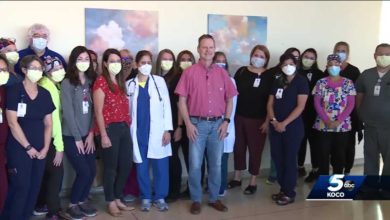
- Myocarditis is inflammation of the heart muscle and is often related to a viral infection.
- Myocarditis typically causes shortness of breath and chest pain.
- The risk of getting myocarditis from a COVID-19 vaccine is less than 1%.
You may have seen the recent reports linking rare cases of myocarditis, which is inflammation of the heart muscle, to Pfizer and Moderna COVID-19 vaccines.
Health experts including Dr. Chandhiran Rangaswamy, a University of Louisville Health physician who specializes in cardiovascular medicine, said the side effect is extremely rare and the focus should remain on the good that vaccines are doing and have done, similar to what the Centers for Disease Control and Prevention advises.
In July, for example, Yale and Commonwealth Fund researchers reported COVID-19 vaccines saved an estimated 279,000 lives and prevented 1.25 million hospitalizations.
Rangaswamy said while myocarditis does happen to some people after receiving their vaccination, he said the risk is extremely low — less than 1%.
Here are some key things to keep in mind about myocarditis, COVID-19 and vaccines:
How many people have been vaccinated in the US?: Tracking COVID-19 vaccine distribution by state
What is myocarditis?
Myocarditis is inflammation of the heart muscle and is most often seen in relation to a viral infection. The inflammation reduces the heart's ability to pump, according to the Mayo Clinic.
"Any virus, including the flu virus, can potentially cause myocarditis," he said. "We know that drugs, whether they are illicit drugs or even prescription medications, can also cause myocarditis.
"So, basically anything that can stimulate an inflammatory response can transpose itself on to the myocardium, which is the heart muscle, and cause myocarditis that way."
What are symptoms of myocarditis?
Myocarditis typically causes shortness of breath, chest pain feeling like your heart is pounding fast. The Centers for Disease Control and Prevention advises anyone experiencing those symptoms to seek medical help, especially if they occur less than a week after receiving the vaccine.
The CDC says people typically respond well to medicine and feel better quickly enough to return to normal daily activities shortly after.
Typical side effects of the vaccine include tiredness, fever, nausea, headaches and muscle pain, but they typically only last for a few days.
New COVID variant:What we know about the mu variant and why Fauci is 'keeping a very close eye on it'
Do vaccines cause myocarditis?
Any vaccine, like the flu vaccine, can cause myocarditis and inflammatory reactions, Rangaswamy said. In May, a vaccine safety group with the CDC was investigating reports of myocarditis occurring in young adults and teens who received the COVID-19 vaccine.
However, the risk of getting myocarditis from a COVID-19 vaccine is less than 1%, he said. And, he reminded, the virus itself is more dangerous. Even before vaccines were available to the general public, heart issues related to COVID-19 raised concern for numerous athletes.
"As with anything in medicine, we look at the risk-benefit ratio. The risk of taking that vaccine is far outweighed by the benefit of preventing yourself from getting COVID-19," he said, "and more importantly, preventing any of the major complications that could arise from acquiring COVID-19."
Related:You're more likely to get a blood clot after COVID infection than with the vaccine
'Mark of the beast?':Some say COVID-19 vaccine is evil. Is there a connection to the Bible?
Those complications could include pneumonia, lifelong pulmonary issues for those who have to be intubated, heart rate issues, blood pressure issues and more.
In June, there were 323 cases of heart inflammation in people ages 12 to 29 who had gotten the Pfizer or Moderna vaccines. A joint statement by the CDC, U.S. Department of Heath and Human Services and 15 medical, public health and provider organizations called it an "extremely rare side effect" that "only an exceedingly small number of people will experience" once they're vaccinated.

Is a certain population more vulnerable to the rare complication?
The CDC said young people, particularly males, may be more susceptible to the rare side effect within several days after their inoculation. But Rangaswamy said it's not clear who's more affected at this time.
"It's very hard to actually say what population is necessarily more vulnerable," he said, "...because there's a lot of selection bias that goes to those epidemiological studies."
Is a certain vaccine more likely to cause myocarditis?
It's unclear.
"When you're talking about such a small percentage, or incidence rate, of the condition to begin with, it's very hard to differentiate one from the other unless you have a large sample size of the actual condition," Rangaswamy said.
COVID-19 and sports:Why young athletes who have contracted COVID-19 have to play it safe
Follow Sarah Ladd on Twitter: @ladd_sarah. Follow Jordan Mendoza on Twitter: @jordan_mendoza5








